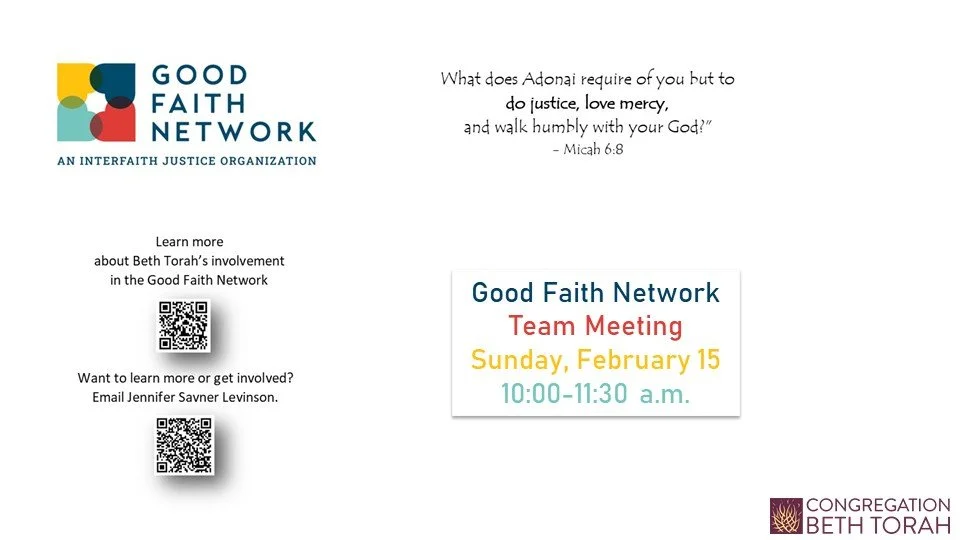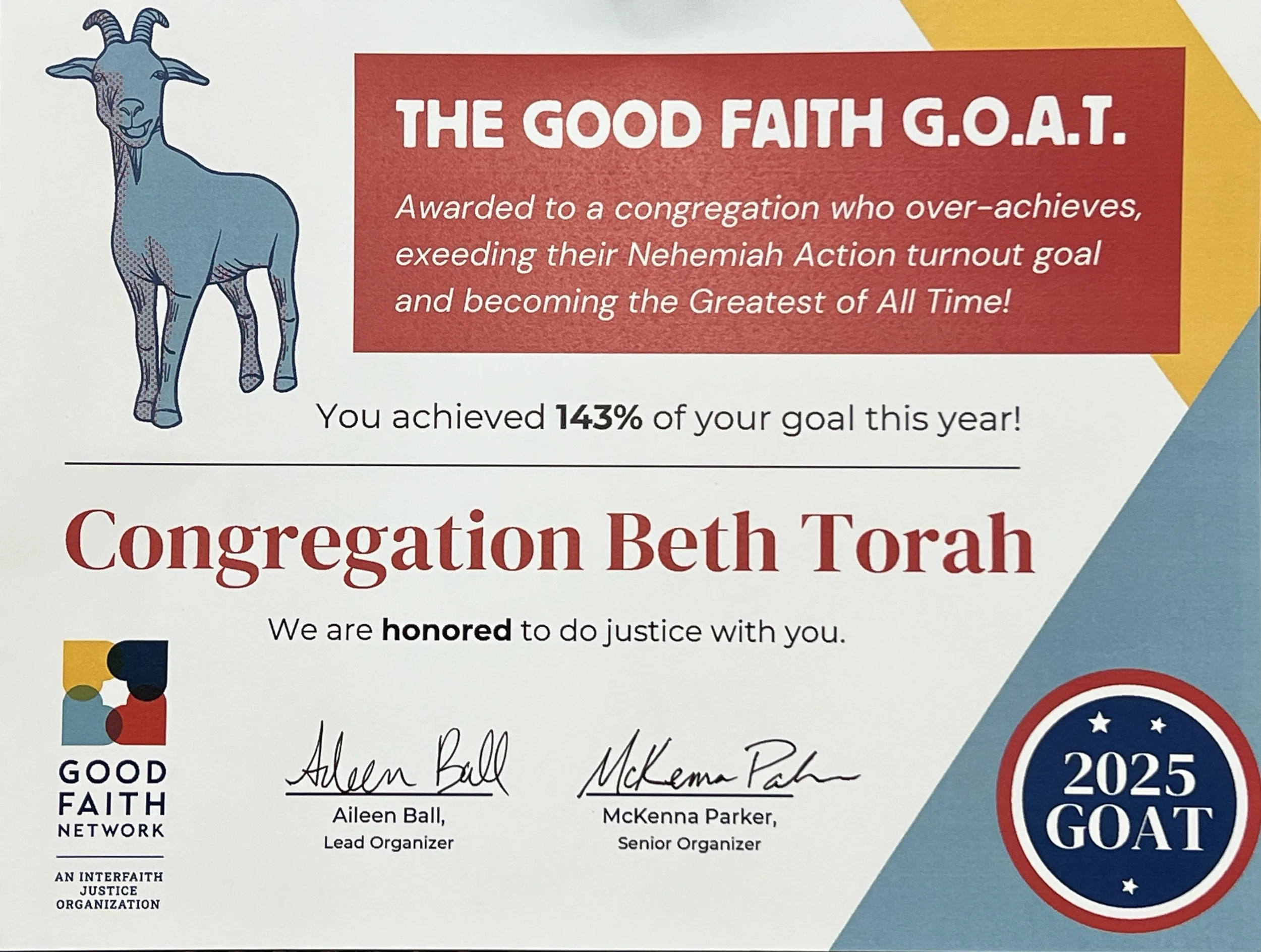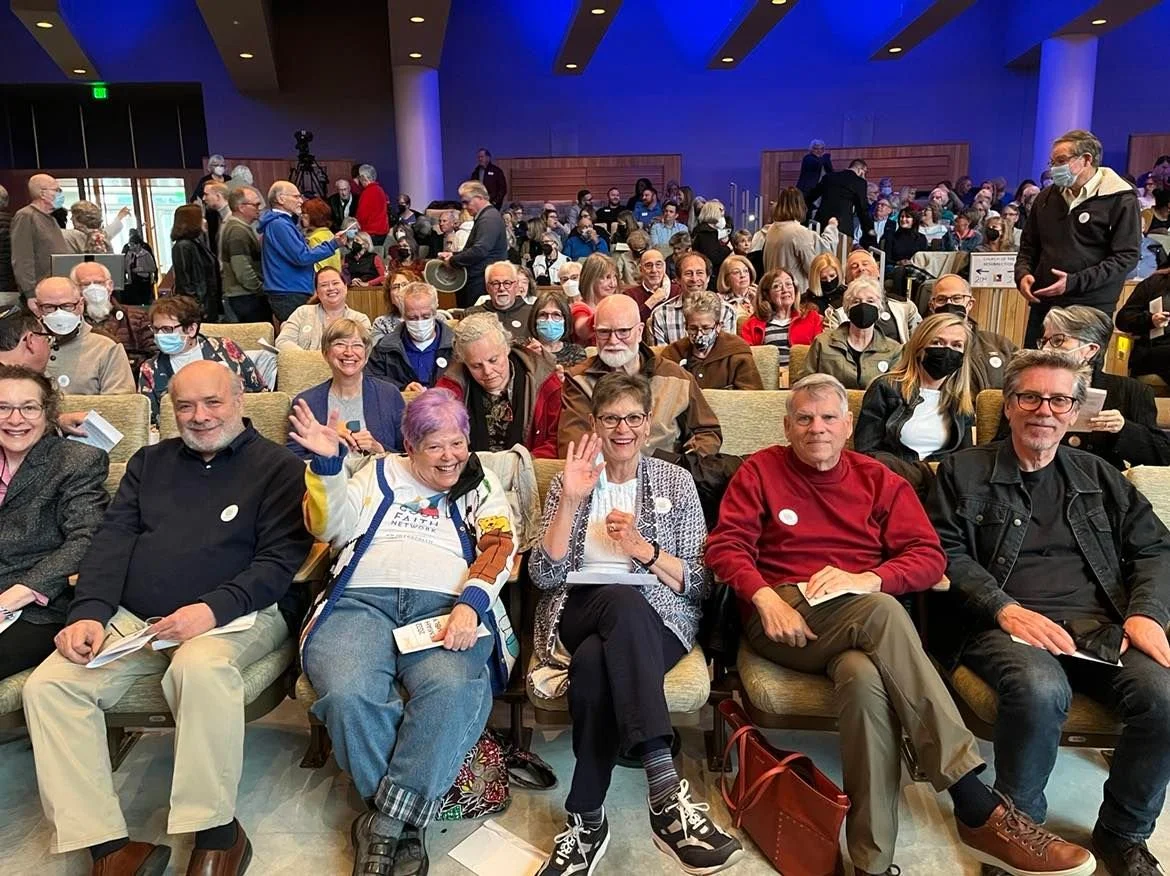Who We Are...
The Good Faith Network is a nonpartisan interfaith group composed of 20+ congregations across Johnson County with a mission of pursuing justice around our community's most pressing problems. Each fall we hold a listening process of over 65 small groups conversations in our congregations to uncover those problems. Based upon those conversations, The Good Faith Network votes on which issue(s) to focus on (see below for more information about these focuses).
An Introduction by CBT’s Jennifer Savner Levinson
Beth Torah’s involvement is spearheaded by our very own Jennifer Savner Levinson. She is on The Good Faith Network board of directors, co-chairing the Mental Health Research Committee, and is a past member of the Beth Torah board of trustees. Under her leadership, this has become one of Beth Torah’s largest opportunities to participate in this act of tikun olam: working for systemic change. The Good Faith Network has 500 members in the network, all working together for the betterment of our community.
Good Faith Network in Action
“Everything we’re doing is really radically upstream prevention. So people don’t find themselves in crisis and floundering and looking and panicking, ‘What do I do?’, or struggling in silence.” – Jennifer Savner Levinson, member at Congregation Beth Torah in Overland Park and co-chair of Good Faith Network’s mental health committee. You can read more about them here: https://shawneemissionpost.com/2022/04/04/good-faith-network-143932/
Anyone interested in getting involved or learning more about Good Faith Network, including folks without ties to a faith or local faith group, can visit https://www.thegoodfaithnetwork.org/contact.
During the Nehemiah Assembly we gather with other members of the Good Faith Network to learn about well-researched solutions around the current cycle issues.
Todah Rabbah | Thank You to Jennifer Savner Levinson, Scott Franklin, Tamara Falicov, Brandi Fisher, Marcia Rittmaster, and Carol R Ducak for their unwavering commitment to Tikkun Olam (Repairing the World) through the Good Faith Network!
-
We started out as “the Johnson County Interfaith Justice Organization,” Our story is that we engage in this work as an expression of our diverse faith traditions. For each of us it is our faith that compels us to seek the common good together, to work for justice, to speak the truth about what is happening in our community, and to call for honesty and fairness in how the vulnerable are treated. That will be the story of this interfaith organization for years to come. As a naming committee reflected on that story, a concept emerged from several of the ideas that were submitted from across the network. Gradually, one phrase began to stand out.
That phrase was good faith. “Good faith” as in the sense of our open, honest dealings with each other and our neighbors. “Good faith” as in the best of what our faiths have to offer; the most virtuous aspects of our diverse faith traditions. “Good faith” as in a recognition of all the good that can happen when people of faith come together to work for justice. “Good faith” reflects the heart of this organization and our hopes and dreams for what we can become together.
-
In the listening process we held this fall, we heard heartbreaking stories about individuals and families desperately seeking mental health care in our community, but being unable to access it at every socio-economic level. We heard stories about addiction, suicide, mental health struggles that prevent folks from working. We heard about the stress and trauma of the pandemic, overwhelmed school social workers, and mental health workers who are overworked and underpaid. One thing is clear: current resources for mental health care in our community have been insufficient relative to the need.
For people in mental health crisis in our community, families don't have the tools to help, the wait times for care are too long, and too often the emergency room is the only solution. We must change this; we can't afford to wait.
-
On a given night, over 180 people are homeless in Johnson County. In a given year, up to 1,000 students in Johnson County are precariously housed or homeless. While there are a few homeless shelters for families in Johnson County, there's no permanent shelter for single women and men. This is happening in the wealthiest county in Kansas. We can do better.
-
In our 2023 listening process, the lack of safe, affordable housing was the most cited concern among participants in our Community Conversations. Johnson County has some of the least affordable housing in Kansas - median home prices are above the national averages and nearly 40% of renters are considered cost-burdened, meaning that they pay more than 30% of their household income on housing. Furthermore, 45% of people who are employed in Johnson County commute in from other communities where housing costs are attainable by comparison.
Johnson County is an affluent community, but it is untenable to retain that status by pricing low-income families --and increasingly middle-income families--out of this county. We must solve the lack of affordable housing for the most vulnerable in our community.
-
Our research kickoff began December 7, 2021.
The Mental Health research committee held 17 interviews with subject matter experts that included executive directors of community mental health centers and other nonprofit mental health agencies; co-responders and law enforcement; clinicians; the commissioner of Kansas Department of Aging and Disability; community advocate; parents; and individuals struggling with mental health. Throughout the 17 interviews there were 4 themes we heard consistently that will inform how we approach this focus:
•Mental health services are limited
•Services are difficult to locate and navigate
•Crisis stabilization services are limited
•Supportive housing options are limited
The Homelessness research committee held 13 interviews with subject matter experts, reviewed data, and held study session. These study sessions included executive directors of nonprofit community agencies; co-responders and law enforcement; snapshots of homelessness through the lens of the Point in Time Count (an annual survey of homelessness) and Project 1020 (cold weather shelter in Lenexa); and McKinney-Vento data regarding homeless students in Johnson County. Throughout the 13 interviews there were 3 themes we heard consistently that will inform how we approach this focus:
•There is no centralized entity charged with ending homelessness in Johnson County
•There is no year-round shelter for single adults in Johnson County
•There is no supply of permanent supportive housing in Johnson County
The Homelessness Committee understands that supportive housing issues also strongly affect those facing mental health struggles. These two committees will work together where this overlap occurs.
If you would like to learn more about this, please CLICK HERE TO VISIT THEIR WEBSITE.




